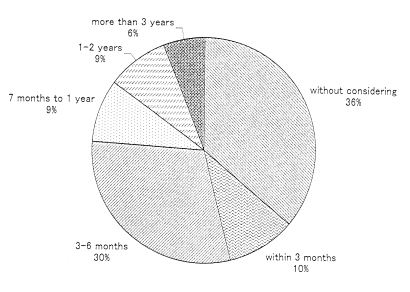Situation and problem of administration methods and the intermission of hypnotics
Abstract
Abstract The results of a questionnaire survey suggested four problems that might prolong the administration of benzodiazepine hypnotics without suspending the medication. First, psychiatrists did not actively consider the necessity of suspension of medication with hypnotics. Second, the period between improvement of insomnia and initiation of dose reduction was long, whereas the period between initiation of dose reduction and discontinuation was short. Third, to suspend medication of a hypnotic, every-other-day administration was used for the very short-acting and short-acting types, and substitution of the intermediate-acting or long-action type for the drugs with a short half-life were performed frequently. Finally, dose reduction and intermission of medication induced rebound insomnia, withdrawal symptoms, and recurrence of insomnia.
INTRODUCTION
We have previously reported the results of a questionnaire survey regarding the use and intermission of benzodiazepine (BZ) hypnotics in 862 outpatients attending a psychiatric department.1 While many patients had received medication for prolonged periods, many patients had stopped taking the drug against the physician’s advice because of anxiety regarding hypnotics and the development of withdrawal symptoms and recurrent insomnia, which might have resulted in prolongation of the need for medication. In the present study, we investigated the situation and problems with administration methods and the intermission of BZ hypnotics among psychiatrists.
METHOD
The subjects comprised 106 psychiatrists (98 males and eight females). Their mean age was 44.7 years old (range 25–79 years), and their mean period of experience as a psychiatrist was 17.6 years. We performed a questionnaire survey regarding the methods of administration and intermission of BZ hypnotics such as planned administration period, period between improvement of insomnia and initiation of dose reduction, method of dose reduction, period between initiation of dose reduction and discontinuation (dose reduction period), incidences of withdrawal symptoms and rebound insomnia, frequency of recurrent insomnia, and necessity of suspension of medication for patients with psychophysiological insomnia.
RESULTS
With regard to the planned administration period, ‘period was not considered’ was the most frequent answer, accounting for 36%. This was followed by ‘3– 6 months’, accounting for 30%; ‘less than 3 months’ accounted for 10%, and ‘7 months to less than 1 year’ accounted for 9%, demonstrating that 40% of the psychiatrists planned a 6-months or shorter administration period (Fig. 1). The period between improvement of insomnia and initiation of dose reduction was 2–3 months in 33%, 4–6 months in 25%, and not considered in 12%, demonstrating that 4 months or longer accounted for more than half (57%). With regard to the method of dose reduction for each type of hypnotic, the tapering method was most frequent (39–47%), whereas every-other-day administration was the second most frequent (22–24%). Substitution of ‘the very short-acting or short-acting type’ for ‘the intermediate-acting type’, substitution of ‘the intermediate-acting type’ for ‘the very short-acting type or short-acting type’, and substitution of ‘the long-acting type’ for ‘the intermediate-acting type’ was frequent. Among drugs used for long-term administration of a single drug, short-acting types accounted for 42% and intermediate-acting types accounted for 39%. With regard to the dose reduction period, 1–3 months was most frequent (44%), followed by 4–6 months, which accounted for 24%, and 2 weeks to 1 month accounted for 18%, demonstrating that a period of 3 months or shorter accounted for 64%. The incidence of developing withdrawal symptoms and rebound insomnia was 19.0%, and the frequency of recurrent insomnia due to dose reduction was 25.7%. As for the necessity of suspension of medication of hypnotics, 5% of the psychiatrists answered that it was necessary, whereas 23% answered ‘not necessary’ and 72% answered ‘not determined’. Medication was suspended in 18.0% of patients.

. The planned administration period of hypnotics.
DISCUSSION
Those patients who continued to take BZ hypnotics for 6 months or longer were proposed as the standard in defining the clinical low-dose dependence of BZ hypnotics.2 In the present survey, 40% of the psychiatrists initiated administration by planning an administration period of 6 months or shorter, whereas 36% started administration without considering the administration period. Moreover, only 5% answered that intermission of medication of hypnotics was necessary, indicating that they did not actively consider the necessity of suspension of medication with hypnotics. It was suggested that dose reduction and intermission were not successful, and rebound insomnia, withdrawal symptoms, and recurrent of insomnia were induced, resulting in prolonging the need for medication. The results of the present survey suggested that there were problems with the psychiatrists’ attitudes and skill concerning the methods of administration and intermission of hypnotics.
Briefly, to avoid the clinical low-dose dependence of BZ hypnotics, physicians should initially and aggressively consider intermission. The period between improvement of insomnia and initiation of dose reduction should also be short (i.e. 2–3 months), although the dose reduction period should be as long as 3–6 months. Furthermore, on discontinuing administration of the very short-acting or short-acting types, a method of decreasing the dose gradually should be employed or the drug type should be switched to the long-acting type.




